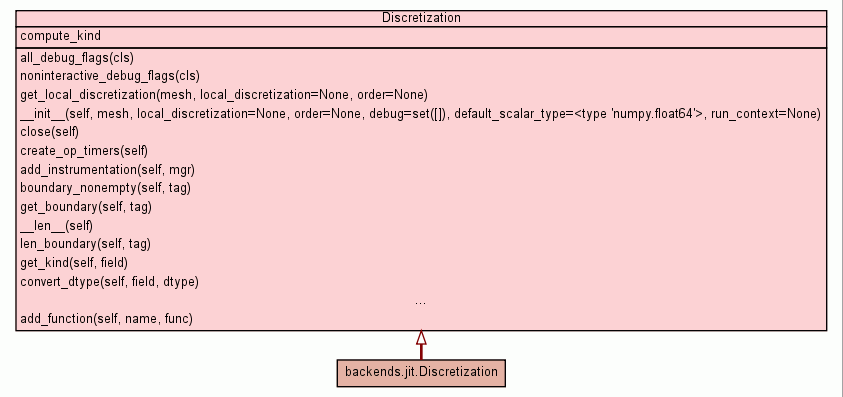The global approximation space.
Instances of this class tie together a local discretization (i.e.
polynomials on an elemnent) into a function space on a mesh. They provide
creation functions such as interpolating given functions, differential
operators and flux lifting operators.
|
|
__init__(self,
mesh,
local_discretization=None,
order=None,
debug=set([]),
default_scalar_type=<type 'numpy.float64'>,
run_context=None)
x.__init__(...) initializes x; see x.__class__.__doc__ for signature |
source code
|
|
|
|
|
|
|
|
|
|
|
|
|
| _build_element_groups_and_nodes(self,
local_discretization) |
source code
|
|
|
|
|
|
|
| _set_flux_face_data(self,
f,
ldis,
(el, fi)) |
source code
|
|
|
|
|
|
|
|
|
|
|
|
|
__len__(self)
Return the number of nodes in this discretization. |
source code
|
|
|
|
|
|
|
|
|
|
|
|
|
|
|
|
|
|
|
| convert_boundary_async(self,
field,
tag,
kind,
read_map=None) |
source code
|
|
|
|
volume_empty(self,
shape=(),
dtype=None,
kind='numpy') |
source code
|
|
|
|
volume_zeros(self,
shape=(),
dtype=None,
kind='numpy') |
source code
|
|
|
|
| interpolate_volume_function(self,
f,
dtype=None,
kind=None) |
source code
|
|
|
|
boundary_empty(self,
tag,
shape=(),
dtype=None,
kind='numpy') |
source code
|
|
|
|
boundary_zeros(self,
tag,
shape=(),
dtype=None,
kind='numpy') |
source code
|
|
|
|
| interpolate_boundary_function(self,
f,
tag,
dtype=None,
kind=None) |
source code
|
|
|
|
|
|
|
| volumize_boundary_field(self,
bfield,
tag,
kind=None) |
source code
|
|
|
|
| boundarize_volume_field(self,
field,
tag,
kind=None) |
source code
|
|
|
|
| boundarize_volume_field_async(self,
field,
tag,
kind=None) |
source code
|
|
|
|
|
|
|
|
|
|
|
|
|
|
|
|
|
|
|
|
|
|
|
|
|
|
|
|
|
|
|
|
|
|
|
|
|
|
|
|
|
|
|
|
|
|
dt_factor(self,
max_system_ev,
stepper_class=None,
*stepper_args)
Calculate the largest stable timestep, given a time stepper
`stepper_class`. |
source code
|
|
|
|
|
|
|
| compile(self,
optemplate,
post_bind_mapper=<function <lambda> at 0x94b925c>) |
source code
|
|
|
|
|
|
Inherited from object:
__delattr__,
__getattribute__,
__hash__,
__new__,
__reduce__,
__reduce_ex__,
__repr__,
__setattr__,
__str__
|

